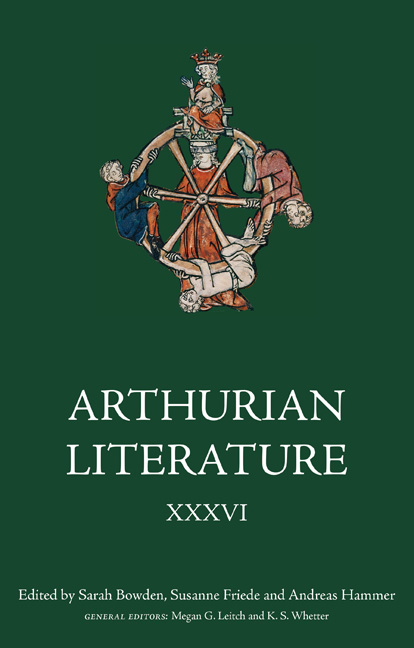Book contents
- Frontmatter
- Contents
- General Editors’ Preface
- List of Contributors
- Introduction: Sacred Space and Place in Arthurian Romance
- 1 The Church and the Otherworld: Sacred Spaces in the Matière de Bretagne and Medieval Ireland
- 2 Sacred Spaces: the Syntagmatic and Paradigmatic Construction of Narrated Space in Chrétien’s Conte du Graal
- 3 Perceiving the Way: Sacred Spaces and Imaginary Pilgrimage in the Vulgate Cycle Queste del Saint Graal and Thomas Malory’s ‘Tale of the Sankgreal’
- 4 Affirming Absence and Embracing Nothing: on the Paradoxical Place of Heterosexual Sex in Medieval French Verse Romance
- 5 Spaces of Remorse: Penitential Allusions in Iwein
- 6 The Spatial Narratives of Salvation and Damnation in Wigalois and the Prose Lancelot
- 7 ‘Fantoum and Fayryȝe’: Visions of the End of Arthurian Britain
- 8 The Tomb of the Kings: Imperial Space in Arthur’s Camelot
- Contents of Previous Volumes: Details of Earlier Titles are Available from the Publishers
5 - Spaces of Remorse: Penitential Allusions in Iwein
Published online by Cambridge University Press: 17 April 2021
- Frontmatter
- Contents
- General Editors’ Preface
- List of Contributors
- Introduction: Sacred Space and Place in Arthurian Romance
- 1 The Church and the Otherworld: Sacred Spaces in the Matière de Bretagne and Medieval Ireland
- 2 Sacred Spaces: the Syntagmatic and Paradigmatic Construction of Narrated Space in Chrétien’s Conte du Graal
- 3 Perceiving the Way: Sacred Spaces and Imaginary Pilgrimage in the Vulgate Cycle Queste del Saint Graal and Thomas Malory’s ‘Tale of the Sankgreal’
- 4 Affirming Absence and Embracing Nothing: on the Paradoxical Place of Heterosexual Sex in Medieval French Verse Romance
- 5 Spaces of Remorse: Penitential Allusions in Iwein
- 6 The Spatial Narratives of Salvation and Damnation in Wigalois and the Prose Lancelot
- 7 ‘Fantoum and Fayryȝe’: Visions of the End of Arthurian Britain
- 8 The Tomb of the Kings: Imperial Space in Arthur’s Camelot
- Contents of Previous Volumes: Details of Earlier Titles are Available from the Publishers
Summary
In Hartmann von Aue's Iwein (c.1200), after it has become clear that the protagonist has broken his oath to his wife by staying away too long and as a result loses all reason, he desires only one thing: ‘daz er wære ettewâ / daz man noch wîp enweste wâ / unde niemer gehôrte mære / war er bekommen wære’ (‘that he might be in some place / of which neither man nor woman knew the whereabouts, / and that they would never hear tidings / of where he had gone.’). He leaves the field of tents that makes up the Arthurian court, running across the fields ‘nâch der wilde’ (l. 3238), and it is in this wilderness – also referred to as the forest (‘wald’/‘walde’) – that the episode conventionally referred to as Iwein's madness plays out. In whatever light the so-called madness is considered, its specific location in the forest away from society is of central importance to its interpretation. Scholarly attention has typically focused on the ways in which the episode and its setting reflect on the interaction between civilization and the wild, between man and animal, between culture and nature: areas of investigation commonly held to be central to the interpretation of the text as a whole. More generally, it has been shown repeatedly that this is a text where much is to be gained from the analysis of the locations in which the protagonist finds himself, the ways in which he moves between different spaces or spheres, and how the differences between these spaces – for instance, the court and the woods or the Arthurian world and Laudine's fountain realm – are negotiated or overcome.
Although the forest in which Iwein runs wild is apart from the court and the rest of society, it is not entirely uninhabited, for it is also the home of a man who lives in a little house on a freshly cleared patch of ground (‘ein niuwez geriute’, l. 3285). Although he is initially frightened of the ‘fool’ (‘tôre’, l. 3295) who has invaded his patch, this man gradually builds a relationship with Iwein on the premise of cooperation and mutual aid: Iwein provides the game, the man a way of cooking it, water, bread and eventually, through selling animal skins at market, salt and bread of a better quality (ll. 3283–3344).
- Type
- Chapter
- Information
- Arthurian Literature XXXVISacred Space and Place in Arthurian Romance, pp. 105 - 124Publisher: Boydell & BrewerPrint publication year: 2021

